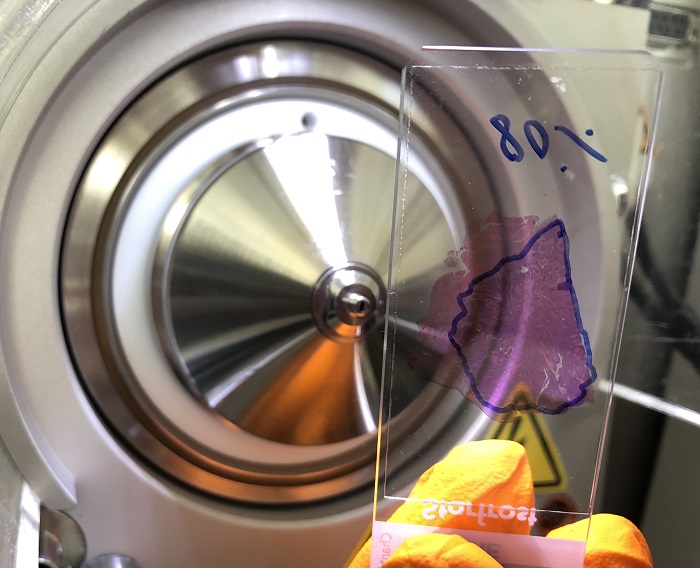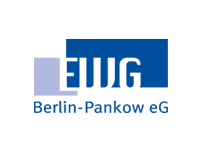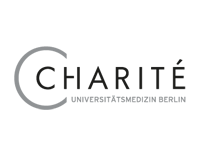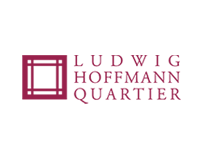Your selection
Research / 17.06.2021
Probing deeper into tumor tissues

Researchers at the MDC, the BIH and Charité have developed methods for performing comprehensive analyses of fixed tumor tissue samples. These analyses make it possible to shed new light on the clinical course of various cancer types, as the team reports in Nature Communications.
Today as they did 100 years ago, doctors diagnose cancer by taking tissue samples from patients, which they usually fix in formalin for microscopic examination. In the past 20 years, genetic methods have also been established that make it possible to characterize mutations in tumors in greater detail, thus helping clinicians select the best treatment strategy.
Even tiny tissue samples can be used to detect proteins
Now, a group of researchers from the Berlin-based Max Delbrück Center for Molecular Medicine in the Helmholtz Association (MDC), the Berlin Institute of Health (BIH), Charité – Universitätsmedizin Berlin and the German Cancer Consortium (DKTK) have succeeded in analyzing in detail more than 8,000 proteins in fixed samples of lung cancer tissue using mass spectrometers.
“Using the methods we have developed, it has become possible to conduct an in-depth analysis of molecular processes in cancer cells at the protein level – and to do so in archived patient samples that are collected and stored in large numbers in everyday clinical practice,” says Dr. Philipp Mertins, head of the Proteomics Platform at the MDC and the BIH. “Even very small tissue samples, such as those obtained in needle biopsies, are sufficient for our experiments.”
The study, published in the journal Nature Communications, is considered a major success for the Multimodal Clinical Mass Spectrometry to Target Treatment Resistance (MSTARS) research project, which has been funded by the German Federal Ministry of Education and Research (BMBF) to the tune of around €5.7 million since 2020.
The team of researchers, led by Mertins and Professor Frederick Klauschen from the Institute of Pathology at Charité, has been able to show that proteins – unlike the frequently studied yet quite sensitive RNA molecules – remain stable in the samples for many years and can be precisely quantified. “In addition, the proteins that are present in the tumor tissue map disease progression especially well,” says lead author Corinna Friedrich, a PhD student in the labs of Mertins and Klauschen. “This is because they provide information about such things as which of the genes that promote or inhibit tumor growth are particularly active in the cells.”
The methods promise to help identify the best treatment for each tumor
The picture gained from the team’s analysis of two forms of lung cancer – adenocarcinomas and squamous cell carcinomas – has also become so detailed because the researchers have not only uncovered a great many of the proteins present in the cell, but have also quantified more than 14,000 phosphosites. With the help of phosphorylation, a mechanism that regulates the reversible attachment of phosphate groups to proteins, the cell controls almost all biological processes by switching certain signaling pathways on or off.
“Our paper thus provides a good basis for gaining a better understanding of disease progression in lung cancer and also in other types of cancer,” says Klauschen, who, along with Mertins, is co-corresponding author of the study. Klauschen has since become director of the Institute of Pathology at Ludwig-Maximilians-Universität München, but continues to conduct research at Charité. “The methods we have developed will also enable us to better explain in the future why a very specific therapy works for some patients but not for others,” adds the pathologist. This will, he says, make it easier, to find the best treatment option for each patient.
Methods also suitable for researching cardiovascular diseases
Mertins also hopes that the mass spectrometric analysis of the proteome in tissue samples will pave the way for the discovery of not only new biomarkers for therapeutic decisions and patient survival predictions, but also other molecular structures that could serve as targets for future drugs.
And, according to the researcher, there is yet another plus to the new approach: “Our methods are not only suitable for researching cancer, but can also be applied very broadly.” For example, the Proteomics Platform has already successfully analyzed the proteome of fixed immune cells from COVID-19 patients. The authors have also provided guidelines on which mass spectrometric methods are best suited for different types of clinical studies.
Next on the agenda for the MDC platform is the mass spectrometric analysis of additional fixed immune cells as well as fixed cardiovascular tissue for the presence of proteins and phosphosites. “The aim here is to get a better understanding of infectious and cardiovascular diseases,” explains Mertins, “so that one day it might be possible to treat these diseases in a much better way than has so far been the case.”
Text: Anke Brodmerkel
Literature
Corinna Friedrich et al (2021): “Comprehensive micro-scaled proteome and phosphoproteome characterization of archived retrospective cancer repositories,” in: Nature Communications, DOI: 10.1038/s41467-021-23855-w
Source: Joint press release by the MDC, the BIH and Charité
https://www.mdc-berlin.de/news/press/probing-deeper-tumor-tissues
Overview News
News Buch Berlin
From cell biology to CRISPR/Cas – new knowledge for schools
The Life Science Learning Lab at the Berlin-Buch research campus offers both school students and teachers the opportunity to immerse themselves in science. This year, the facility celebrates its 25th ...
more ...ERC grants Berlin scientists € 2.5 million each
Neuroscientists Gary Lewin and James Poulet at the Max Delbrück Center for Molecular Medicine have won highly coveted and competitive ERC Advanced Grants to study pain and the neural mechanisms that u...
more ...The Protein Expert
Prof. Dr. Fan Liu from the Leibniz-Forschungsinstitut für Molekulare Pharmakologie (FMP) has recently received several awards for her contributions to the field of cross-linking mass spectrometry.
more ...Events Buch Berlin
19.04.2024, 08:30
Lehrkräftekongress: Gemeinsam Schüler:innen für Naturwissenschaften begeistern - gemeinsam Zukunft gestalten
Der Verband der Chemischen Industrie e.V., Landesverband Nordost, das Max Delbrück Center, das Leibniz-Forschungsinstitut für Molekulare Pharmakologie im Forschungsverbund Berlin e.V., das Gläserne La...
more ...21.04.2024, 16:00
Großes Sinfoniekonzert "Durch die Nacht zum Licht"
Saisonauftakt der Bürgersinfonie mit Werken von Beethoven, Mendelssohn Bartholdy und Berwald
more ...06.05.2024, 09:00
Realtime PCR und digital PCR Kurs
Der RealTime PCR und Digital PCR Kurs richtet sich an erfahrene PCR Anwender*innen und an Einsteiger*innen. Wichtige PCR Grundlagen werden erörtert, bevor die RealTime PCR besprochen und Genexpression...
more ...







